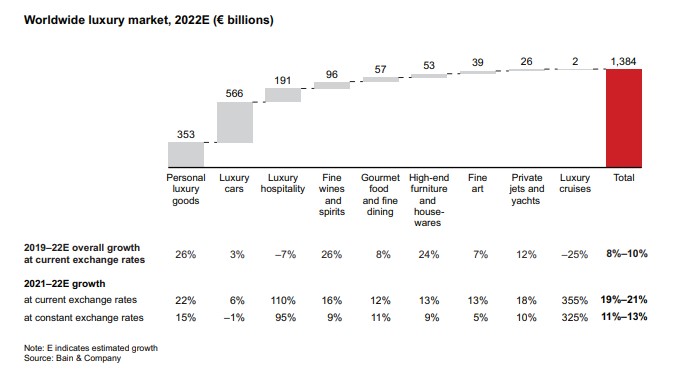On the occasion of the first day of the Monaco Symposium on Luxury organized by the International University of Monaco taking place in the Principality of Monaco from April 4 to 6, 2023, we attended a very interesting event named “New Forms of Luxury… For a Better Tomorrow”. The speakers included Carlo Moltrasio of Bain & Co, Prof. Jean-Noel Kapferer, Espen Oeino of Espen Oeino Yacht Design, Julie Millet of Groupe Mauro Colagreco, Selvane Mohandas du Ménil of the International Association of Department Stores, Yana Ermolaeva of Pininfarina.
The keynote speaker, Carlo Moltrasio, provided an extremely interesting presentation on the current status and the future trends of the luxury goods market that showed that despite the Covid crises of the years 2020/2021 the sales are increasing exponentially as “customers want to spend the money that they saved during the lockdowns”. The most promising markets are those of South East Asia, particularly South Korea, North America, Europe and Middle East. Mainland China is coming back after two difficult years during which the wealthy Chinese population was not allowed to travel abroad. China is expected to return to pre-pandemic luxury goods spending standards in the course of 2023. As a result of the Covid pandemic, luxury brands realized that it is of paramount importance to invest in e-commerce and logistics so to ensure that the sales and products distribution would not stop in case people are not able to travel or to buying in stores. Finally, luxury brands are investing massively in new technologies to reach the younger generations that will be their clients of the future. Consequently, the luxury industry is developing new strategies making recourse to social media, the metaverse and NFTs to target the generations X, Y and Z.

The trends examined for the luxury goods apply to all sectors of the luxury industry, therefore also to superyachts whose owners are big spenders all across the spectrum of luxury items.
Sustainability was of course another big topic of discussion and it was particularly relevant when talking about superyachts. Espen Oeino was very brilliant in providing his views on the current status of the superyacht industry with respect to sustainability. Superyachts, just like supercars or private jets, are part of the luxury industry accounting for a significant portion of the luxury goods’ sales due to the average price of a superyacht and of the luxury items that are directly or indirectly connected with them. However, superyachts, especially motor yachts, are seen as being not sustainable and the industry as a whole is subject to criticism and scrutiny. The recent protests of climate activists occurred in France around the end of September, 2022 against superyachts and their owners, show that the yachting industry has an image issue.
Shipyards are struggling to find ways to design and build yachts that are more sustainable so to counter the negative publicity of the climate activists. The younger generations, which will be the yacht owners of the future, are particularly interested in yachts that: 1) burn less fuel, 2) are built according to more sustainable standards, 3) require less energy when they are not operational; in sum, do not contribute to the pollution the environment. Espen provided his view on the future of yachts and spoke about the use of hydrogen in the commercial marine industry that, one day, may be applied also to superyachts.
We should not forget that sailing yachts are sustainable by definition as they do not require the same quantity of fuel as motor yachts and they are mainly powered by the wind. However, even sailing yachts could be more sustainable if the shipyards found ways to redesign the construction methods and include technology such as solar energy (and wind) for engines and generators.
The conclusion that it is possible to draw after listening to the speeches and contributions presented at the event organized by Monaco Symposium on Luxury is that superyachts undoubtedly belong to the luxury industry but must consider the new demands of the younger yacht owners for more sustainable vessels. Yacht builders shall be looking at finding new communication strategies to reach the yacht owners of the future including the recourse to social media and to new technologies. Sustainability cannot be ignored or set aside for better days if yacht builders, designers and all the other players of the industry would like to have a bright future.